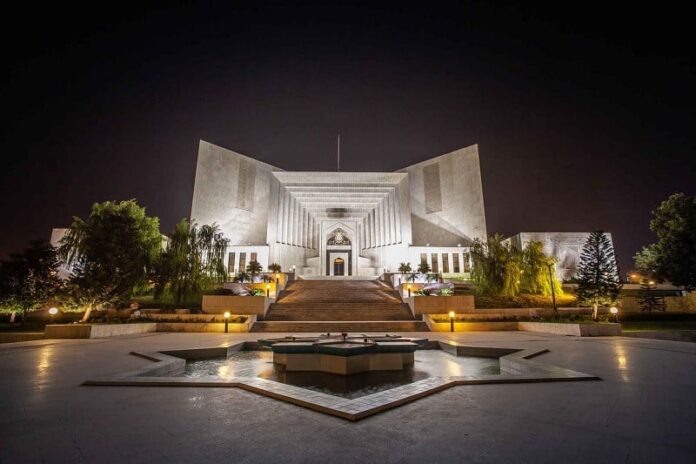The Supreme Court has granted the federal government’s request to remove controversial paragraphs from the contentious Mubarak Sani case verdict. A three-member bench, led by Chief Justice Qazi Faez Isa and including Justices Irfan Saadat Khan and Naeem Akhtar Afghan, heard the federal government’s plea along with the Punjab government’s petition for amendments to the top court’s February 6, ruling.
Previously, the apex court overturned the conviction of Mubarak Sani, who sought the removal of specific charges under the Punjab Holy Quran (Printing and Recording) (Amendment) Act. The court ruled that the alleged offense had not been criminalized until 2021, leading to Mubarak Sani’s immediate release.
Following the ruling, the Punjab government filed a review petition under Article 188 of the Constitution, but on July 24, the Supreme Court reiterated its decision, affirming that it did not diverge from previous Federal Shariat Court and Supreme Court rulings concerning the bail granted to Sani.
The ruling sparked outrage among religious circles, prompting discussions in the National Assembly’s Standing Committee on Law and Justice, where both government and opposition members agreed on the necessity for the federal government to petition the Supreme Court.
Alongside the Punjab government’s request to delete specific parts of the July 24 revised verdict, the federal government filed a miscellaneous plea on August 17, 2024following Prime Minister Shehbaz Sharif’s directives. The Punjab government noted that leading clerics and parliamentarians urged the federal government to address certain aspects of the verdict that they deemed erroneous and inconsistent with previous court rulings.
Religious leaders, including Jamiat Ulema-e-Islam Fazl’s Maulana Fazlur Rehman and Mufti Muhammad Taqi Usmani, attended today’s hearing, supporting the federal government’s approach to the apex court.
In its summary ruling, the Supreme Court stated that the excluded paragraphs could not be cited as precedent in future judgments.
During the hearing, Attorney General for Pakistan Usman Awan informed the court that the federal government had been urged by parliament and religious leaders to revisit the issue following the July 24 verdict. While acknowledging that a second review of the original verdict was not feasible, the AGP stated the government acted in accordance with the Code of Civil Procedure.
Chief Justice Qazi Faez Isa emphasized the importance of correcting mistakes if they occurred and expressed regret to Mufti Usmani, who attended virtually, for the inability to review all submitted documents. He invited the clerics to identify the mistakes and objections within the verdict.
In his request, Mufti Usmani sought the expungement of paragraphs 7 and 42 from the revised ruling, arguing that paragraph 42 implied “unconditional permission” for Mubarak Sani to preach. Fazl supported Usmani’s request, emphasizing that while bail may be appropriate, all charges related to Mubarak Sani’s alleged blasphemy should remain.
The court, after considering the input from various religious scholars, decided to omit the specified paragraphs in line with the recommendations of the Council of Islamic Ideology. The court also instructed the trial court to reassess the charges against Mubarak Sani in accordance with the law.
Following the hearing, Fazl praised the Supreme Court’s decision and Chief Justice Isa’s “positive attitude” during the proceedings. He announced that Friday, August 23, 2024 would be observed as a ‘thanksgiving day’ to celebrate the favorable judgment from the apex court.


